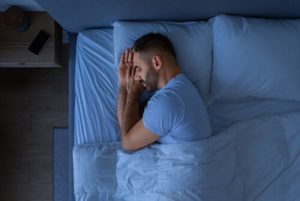
If you wake up with a pounding head more often than not, you may be wondering what’s behind those persistent morning migraines. Could a sleep disorder be at play? More specifically, can sleep apnea cause migraine headaches? The connection between sleep apnea and migraine headaches is becoming increasingly clear in medical research, especially when looking at the impact of disrupted sleep on the brain.
In this guide, we’ll explore how sleep apnea and migraine are connected, what the symptoms look like, and what you can do to treat both for better sleep and fewer migraines.
What Is Sleep Apnea and Why Does It Matter?
 Sleep apnea is one of the most common sleep disorders, and it occurs when your breathing stops and starts repeatedly during sleep. The most frequently diagnosed type is obstructive sleep apnea, which occurs when the muscles in the throat relax excessively, blocking the upper airway.
Sleep apnea is one of the most common sleep disorders, and it occurs when your breathing stops and starts repeatedly during sleep. The most frequently diagnosed type is obstructive sleep apnea, which occurs when the muscles in the throat relax excessively, blocking the upper airway.
People with obstructive sleep apnea syndrome or sleep apnea syndrome experience frequent sleep apnea episodes, including apnea episodes that prevent restful sleep. Loud snoring, daytime fatigue, and excessive daytime sleepiness are also frequent symptoms. These interruptions to breathing can significantly reduce sleep quality and lead to chronic health issues.
Understanding Migraine Headaches
Migraine headaches are a type of primary headaches that cause severe, throbbing pain, usually on one side of the head. Some people suffer from episodic migraine, while others deal with chronic migraine, where migraine attacks occur 15 or more days per month.
Migraine symptoms can include nausea, visual disturbances, and sensitivity to light and sound. Migraine headaches throb in a way that is hard to ignore and can be debilitating. The International Headache Society provides clinical criteria to help diagnose and classify these headaches. Migraine patients often have a lower tolerance for pain and triggers, which can include poor sleep and stress.
The Connection Between Sleep Apnea and Migraines
So, how does a breathing disorder during sleep relate to the pain in your head? The connection between sleep apnea and migraine is complex but well-supported. Let’s look at a few key ways they interact:
Disrupted Sleep Patterns
Sleep disordered breathing and sleep disturbances from sleep apnea can cause sleep deprivation and poor sleep quality. A lack of restful REM sleep or rapid eye movement sleep may trigger migraine attack onset. People with disrupted sleep patterns are more likely to suffer from frequent headaches, particularly in the early morning.
Oxygen Deprivation
During sleep apnea episodes, the body is deprived of oxygen. This lack of oxygen can lead to inflammation, changes in blood vessels, and ultimately, headache pain. This is why many people experience morning headache symptoms, especially those with recurrent morning headache patterns associated with apnea-induced headaches.
Increased Inflammation
Chronic inflammation caused by obstructive sleep can influence migraine progression. Migraine and sleep apnea together can lead to chronic headache issues and increase migraine frequency, especially among chronic migraine patients.
Impact on Daily Life
Because sleep apnea contributes to poor sleep and daytime sleepiness, it can increase the risk of mood disorders, reduce work performance, and increase migraine episodes. Migraine and sleep quality are closely linked, and unmanaged sleep apnea is a major sleep disruption that impacts migraine symptoms significantly.
Recognizing the Signs: Migraine or Sleep Apnea?
If you experience morning headaches, daytime fatigue, or migraine attacks that worsen with poor sleep, it might not just be bad luck. These could be signs of an underlying sleep-related breathing disorder.
Some headache characteristics linked to sleep apnea include:
- Throbbing pain on both sides of the head
- Headache pain that improves a few hours after waking
- Headaches not linked to physical activity
- Apnea-related headaches occurring without aura
You may also notice you feel unrefreshed after sleep, snore loudly, or experience fragmented sleep onset. All these signs suggest that sleep-disordered breathing may be a contributing factor.
Who’s at Risk?
Certain risk factors make you more likely to suffer from both sleep apnea and migraines:
- High body mass index (BMI)
- A history of chronic migraine or episodic migraine
- Coexisting common sleep disorders such as insomnia
- Mood disorders like anxiety or depression
- A sedentary lifestyle or poor sleep hygiene
Unlike headache-free individuals, people with poor sleep and untreated apnea are more vulnerable to these overlapping conditions.
How to Treat Sleep Apnea and Reduce Migraines
Getting the right diagnosis is the first step. A sleep medicine specialist can order a sleep study to confirm whether you have obstructive sleep apnea or another sleep disorder.
Treatment Options
- Continuous Positive Airway Pressure (CPAP): This device maintains an open airway during sleep and is the most effective treatment for sleep apnea. Many who use it report a reduction in sleep apnea, headaches, and improved overall sleep quality.
- Lifestyle Modifications: Losing weight, avoiding alcohol before bed, and improving sleep hygiene can treat sleep apnea symptoms and trigger migraine episodes less frequently.
- Oral Appliances: These are useful for mild sleep apnea and help keep the upper airway open during sleep.
- Positional Therapy: Training yourself to sleep on your side instead of your back can reduce apnea episodes and help you wake up headache-free.
- Medications: For some patients, medications to manage migraine symptoms may be prescribed in combination with sleep apnea treatments.
By improving sleep quality and addressing the underlying sleep disturbance, both migraine symptoms and apnea-related headaches can be significantly reduced.
Final Thoughts
 So, can sleep apnea cause migraine headaches? The evidence says yes. There is a clear connection between sleep apnea and migraine, especially in individuals with chronic headache patterns and disrupted sleep. Poor sleep, sleep disordered breathing, and other common sleep disorders can act as a trigger for the migraine pathway for many people.
So, can sleep apnea cause migraine headaches? The evidence says yes. There is a clear connection between sleep apnea and migraine, especially in individuals with chronic headache patterns and disrupted sleep. Poor sleep, sleep disordered breathing, and other common sleep disorders can act as a trigger for the migraine pathway for many people.
Suppose you suffer from frequent or severe migraine attacks. In that case, especially if they are accompanied by morning headache symptoms or loud snoring, it might be time to consider whether a sleep-related breathing disorder is playing a role. Receiving the right treatment can lead to improved rest, reduced migraine frequency, and significant enhancements in your overall health and well-being.
References:
https://www.healthline.com/health/sleep-apnea-and-migraines
https://pmc.ncbi.nlm.nih.gov/articles/PMC3056010/
https://www.uhhospitals.org/blog/articles/2023/03/morning-headaches-sleep-apnea-could-be-the-cause
https://www.sciencedirect.com/science/article/abs/pii/S1087079223001454

